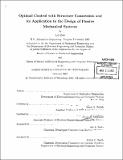Optimal control with structure constraints and its application to the design of passive mechanical systems
Author(s)
Zuo, Lei, 1974-
DownloadFull printable version (11.72Mb)
Other Contributors
Massachusetts Institute of Technology. Dept. of Electrical Engineering and Computer Science.
Advisor
Samir A. Nayfeh and Alexandre Megretski.
Terms of use
Metadata
Show full item recordAbstract
Structured control (static output feedback, reduced-order control, and decentralized feedback) is one of the most important open problems in control theory and practice. In this thesis, various techniques for synthesis of structured controllers are surveyed and investigated, including H2 optimization, H[infinity] optimization, L1 control, eigenvalue and eigenstructure treatment, and multiobjective control. Unstructured control-full- state feedback and full-order control-is also discussed. Riccati-based synthesis, linear matrix inequalities (LMI), homotopy methods, gradient- and subgradientbased optimization are used. Some new algorithms and extensions are proposed, such as a subgradient-based method to maximize the minimal damping with structured feedback, a multiplier method for structured optimal H2 control with pole regional placement, and the LMI-based H2/H[infinity]/pole suboptimal synthesis with static output feedback. Recent advances in related areas are comprehensively surveyed and future research directions are suggested. In this thesis we cast the parameter optimization of passive mechanical systems as a decentralized control problem in state space, so that we can apply various decentralized control techniques to the parameter design which might be very hard traditionally. More practical constraints for mechanical system design are considered; for example, the parameters are restricted to be nonnegative, symmetric, or within some physically-achievable ranges. Marginally statable systems and hysterically damped systems are also discussed. Numerical examples and experimental results are given to illustrate the successful application of decentralized control techniques to the design of passive mechanical systems, such as multi-degree-of-freedom tuned-mass dampers, passive vehicle suspensions, and others.
Description
Thesis (S.M.)--Massachusetts Institute of Technology, Dept. of Mechanical Engineering; and, (S.M.)--Massachusetts Institute of Technology, Dept. of Electrical Engineering and Computer Science, 2002. Page 214 blank. Includes bibliographical references.
Date issued
2002Department
Massachusetts Institute of Technology. Department of Electrical Engineering and Computer Science; Massachusetts Institute of Technology. Department of Mechanical EngineeringPublisher
Massachusetts Institute of Technology
Keywords
Mechanical Engineering., Electrical Engineering and Computer Science.